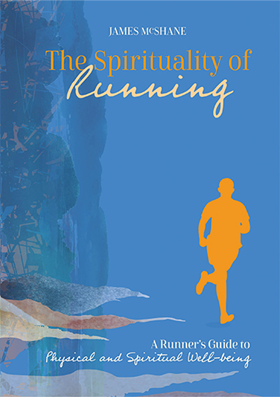In The Spirituality of Running, marathon-running priest James McShane invites readers to consider similarities between physical and spiritual health

In The Spirituality of Running (Redemptorist Publications), James McShane, a marathon-running Catholic priest, invites readers to embark on a reflective journey that intertwines physical exertion with spiritual growth.
McShane adopts the philosophy that life is a marathon, not a sprint. To finish well, we must nurture both physical fitness and spiritual well-being, a perspective shaped by his own experiences after rekindling a childhood passion for running at 38. Initially struggling to complete just 200 yards, his journey highlights the importance of persistence and faith, themes that resonate throughout the book.
The book is primarily aimed at runners seeking to deepen their spirituality through their practice; however, McShane’s insights offer valuable guidance for anyone on a path of self-discovery. He establishes an engaging dialogue between running and developing a prayer routine, making a compelling case that both endeavours require commitment, discipline, and a clear purpose. Many readers will find this parallel relatable, as both athletes and spiritual seekers often face similar challenges of consistency and dedication, combining physical endurance with spiritual exploration.
A significant strength of the book lies in its practical approach to habit formation. McShane provides a robust list of running exercises matched with spiritual counterparts - think fitness drills alongside meditative practices - which offers a unique guide for those interested in harmonising their physical and spiritual lives. This format not only enhances comprehension but also encourages practical application. For example, he compares maintaining a healthy diet to avoiding spiritual “junk food” that hinders growth. This metaphor of nourishing both body and soul offers a fresh perspective on viewing running not merely as physical labour but as a pathway to spiritual enrichment.
Despite the wealth of insights, the book occasionally diverges into less coherent territory. In the second chapter, McShane explores the theology of the body, attempting to connect ideas of embodiment with being created in God’s image. While grounded in established theological principles, the narrative occasionally feels disjointed. His discussion of 1 Corinthians 12, where Paul describes the church as the body of Christ, seems to stray off-topic. The inclusion of various historical figures and examples, ranging from St. Ignatius of Loyola and Martin Luther King Jr to Paul McCartney of the Beatles can feel overwhelming and detract from the streamlined arguments McShane aims to make.
However, the author’s authentic voice and passion come through, creating a relatable and inspiring narrative. His willingness to share personal struggles and triumphs in running reflects his spiritual journey, encouraging readers to reflect on their own experiences. This authenticity reinforces the connection between individual growth and the challenges faced in cultivating a deeper faith and a healthier lifestyle. McShane’s candid reflections challenging readers to embrace vulnerability, emphasising that spiritual and physical journeys are often interlinked.
He advocates for an intentional approach to both running and prayer
McShane recapitulates the fundamental philosophy espoused by St. Alphonsus Liguori, founder of the author’s religious order, the Redemptorists, urging readers to optimise their “nourishing time” while avoiding what he calls “unhealthy time.” The emphasis on prioritising relationships - not only with God and oneself but with others - mirrors his earlier message about balancing exercise with other crucial aspects of life. This serves as a reminder that our spiritual lives should be vibrant, engaged, and dynamic, rather than stagnant or complacent.

He also highlights the communal aspect of both running and spirituality, asserting that neither should be pursued in isolation. Just as runners often gather for support and motivation, the spiritual journey flourishes within a community. This camaraderie found in both realms enhances resilience, fosters growth, and reinforces the notion that running and faith are best experienced collectively.
In addition to these themes, McShane delves into the importance of mindfulness, advocating for an intentional approach to both running and prayer. By being present in the moment, individuals can better appreciate the beauty of their surroundings, foster gratitude, and develop a more profound connection with the divine. This mindfulness approach not only enhances the physical experience of running but complements the spiritual journey, allowing for deeper reflection and engagement with one’s faith.
Overall, The Spirituality of Running offers an engaging read for those seeking to deepen their faith through athletic practice. While the narrative may occasionally meander or lack cohesive structure, McShane’s charm and earnestness shine through, inviting readers to discover the intertwined nature of physical endurance and spiritual development.





































No comments yet